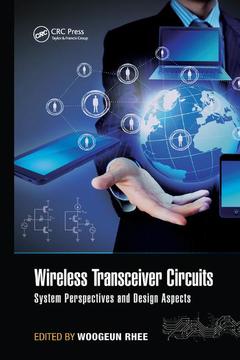Wireless Transceiver Circuits System Perspectives and Design Aspects Devices, Circuits, and Systems Series
Coordonnateur : Rhee Woogeun

Modern transceiver systems require diversified design aspects as various radio and sensor applications have emerged. Choosing the right architecture and understanding interference and linearity issues are important for multi-standard cellular transceivers and software-defined radios. A millimeter-wave complementary metal?oxide?semiconductor (CMOS) transceiver design for multi-Gb/s data transmission is another challenging area. Energy-efficient short-range radios for body area networks and sensor networks have recently received great attention. To meet different design requirements, gaining good system perspectives is important.
Wireless Transceiver Circuits: System Perspectives and Design Aspects offers an in-depth look at integrated circuit (IC) design for modern transceiver circuits and wireless systems. Ranging in scope from system perspectives to practical circuit design for emerging wireless applications, this cutting-edge book:
- Provides system design considerations in modern transceiver design
- Covers both systems and circuits for the millimeter-wave transceiver design
- Introduces four energy-efficient short-range radios for biomedical and wireless connectivity applications
- Emphasizes key building blocks in modern transceivers and transmitters, including frequency synthesizers and digital-intensive phase modulators
Featuring contributions from renowned international experts in industry and academia, Wireless Transceiver Circuits: System Perspectives and Design Aspects makes an ideal reference for engineers and researchers in the area of wireless systems and circuits.
Analysis, Optimization, and Design of Transceivers with Passive Mixers. Receiver IP2 Variability. Mitigation of Performance Degradation in Radio Receiver Front Ends from Out-of-Band Interference. Interference Filtering with On-Chip Frequency-Translated Filters in Wireless Receivers. Analog Signal Processing for Reconfigurable Receiver Front Ends. Design Considerations for Direct Delta-Sigma Receivers. 60 GHz CMOS Transceiver Chipset for Mobile Devices. Ultrahigh-Speed Wireless Communication with Short-Millimeter-Wave CMOS Circuits. Photonics-Enabled Millimeter-Wave Wireless Systems. CMOS Millimeter-Wave PA Design. Millimeter-Wave Frequency Multiplier with Performance Enhancement. CMOS UWB Transceivers for Short-Range Microwave Medical Imaging. Ultralow-Power RF Systems and Building Blocks. Energy-Efficient High Data Rate Transmitter for Biomedical Applications. Design and Implementation of Ultralow-Power ZigBee/WPAN Receiver. All-Digital Phase-Locked Loops for Linear Wideband Phase Modulation. Hybrid Phase Modulators with Enhanced Linearity. Low-Noise PLL-Based Frequency Synthesizer. Low-Phase Noise Quadrature Frequency Synthesizer for 60 GHz Radios. Digitally Controlled Oscillators for Wireless Applications.
Woogeun Rhee holds a B.S. from Seoul National University, South Korea; M.S. from the University of California, Los Angeles, USA; and Ph.D. from the University of Illinois, Urbana-Champaign, USA. Previously, Dr. Rhee was with Conexant Systems, Newport Beach, California, USA, and the IBM Thomas J. Watson Research Center, Yorktown Heights, New York, USA. In August 2006, he joined the Institute of Microelectronics at Tsinghua University, Beijing, China. He holds 19 U.S. patents, has edited numerous scientific journals, and is a member of the Technical Program Committee for the IEEE ISSCC and the IEEE A-SSCC.
Date de parution : 07-2017
15.6x23.4 cm
Date de parution : 02-2015
15.6x23.4 cm
Thèmes de Wireless Transceiver Circuits :
Mots-clés :
Power Consumption; Building Blocks; Phase Noise; Millimeter-Wave Transceivers; Loop Filter; Strategies for Long Range Transceivers for Sensor Networks; Passive Mixers; System Perspectives and Architectures; ΔΣ Modulator; ULP Biomedical and Short-Range Radios; Te Ch; RF Current; Wideband LNAs; Quantization Noise; LC Tank; RF Voltage; Harmonic Rejection; CP; Conversion Gain; Lo Frequency; Frequency Synthesizer; Ring Oscillator; LNA Output; Duty Cycle Clocks; Frequency Multiplier; Direct Conversion Architecture; Digital PLLs; PLL; Noise Cancellation; LNA



